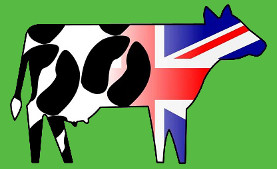By Allard, M. and Dopfer, D. and Kulow, M. and Zibaee, F., J Dairy Sci, 2015
Description
Infectious claw diseases continue to plague cattle in intensively managed husbandry systems. Poor foot hygiene and constant moist environments lead to the infection and spread of diseases such as digital dermatitis (hairy heel warts), interdigital dermatitis, and interdigital phlegmon (foot rot). Currently, copper sulfate and formalin are the most widely used disinfecting agents in bovine footbaths; however, the industry could benefit from more environmentally and worker friendly substitutes. This study determined the in vitro minimum inhibitory concentrations and minimum bactericidal concentrations of Thymox (Laboratoire M2, Sherbrooke, Quebec, Canada) for a selection of microorganisms related to infectious bovine foot diseases. Thymox is a broad-spectrum agricultural disinfectant that is nontoxic, noncorrosive, and readily biodegradable. The values for minimum inhibitory concentration and minimum bactericidal concentration indicated that Thymox inhibited growth and killed the various species of microorganisms under study at much lower concentrations compared with the recommended working concentration of a 1% solution. Overall, the values found in this study of minimum inhibitory concentration and minimum bactericidal concentration of Thymox show its potential as an alternative antibacterial agent used in bovine footbaths; however, field trials are needed to determine its effectiveness for the control and prevention of infectious claw diseases.
Infectious claw diseases continue to plague cattle in intensively managed husbandry systems. Poor foot hygiene and constant moist environments lead to the infection and spread of diseases such as digital dermatitis (hairy heel warts), interdigital dermatitis, and interdigital phlegmon (foot rot). Currently, copper sulfate and formalin are the most widely used disinfecting agents in bovine footbaths; however, the industry could benefit from more environmentally and worker friendly substitutes. This study determined the in vitro minimum inhibitory concentrations and minimum bactericidal concentrations of Thymox (Laboratoire M2, Sherbrooke, Quebec, Canada) for a selection of microorganisms related to infectious bovine foot diseases. Thymox is a broad-spectrum agricultural disinfectant that is nontoxic, noncorrosive, and readily biodegradable. The values for minimum inhibitory concentration and minimum bactericidal concentration indicated that Thymox inhibited growth and killed the various species of microorganisms under study at much lower concentrations compared with the recommended working concentration of a 1% solution. Overall, the values found in this study of minimum inhibitory concentration and minimum bactericidal concentration of Thymox show its potential as an alternative antibacterial agent used in bovine footbaths; however, field trials are needed to determine its effectiveness for the control and prevention of infectious claw diseases.
We welcome and encourage discussion of our linked research papers. Registered users can post their comments here. New users' comments are moderated, so please allow a while for them to be published.
